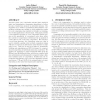Free Online Productivity Tools
i2Speak
i2Symbol
i2OCR
iTex2Img
iWeb2Print
iWeb2Shot
i2Type
iPdf2Split
iPdf2Merge
i2Bopomofo
i2Arabic
i2Style
i2Image
i2PDF
iLatex2Rtf
Sci2ools
127
click to vote
CASES
2006
ACM
2006
ACM
Adaptive object code compression
Previous object code compression schemes have employed static and semiadaptive compression algorithms to reduce the size of instruction memory in embedded systems. The suggestion by a number of researchers that adaptive compression techniques are unlikely to yield satisfactory results for code compression has resulted in virtually no investigation of their application to that domain. This paper presents a new adaptive approach to code compression which operates at the granularity of a program’s cache lines, where the context for compression is determined by an analysis of control flow in the code being compressed. We introduce a novel data structure, the compulsory miss tree, that is used to identify a partial order in which compulsory misses will have occurred in an instruction cache whenever a cache miss occurs. This tree is used as a basis for dynamically building and maintaining an LZW dictionary for compression/decompression of individual instruction cache lines. We applied ou...
Related Content
| Added | 13 Jun 2010 |
| Updated | 13 Jun 2010 |
| Type | Conference |
| Year | 2006 |
| Where | CASES |
| Authors | John Gilbert, David M. Abrahamson |
Comments (0)

